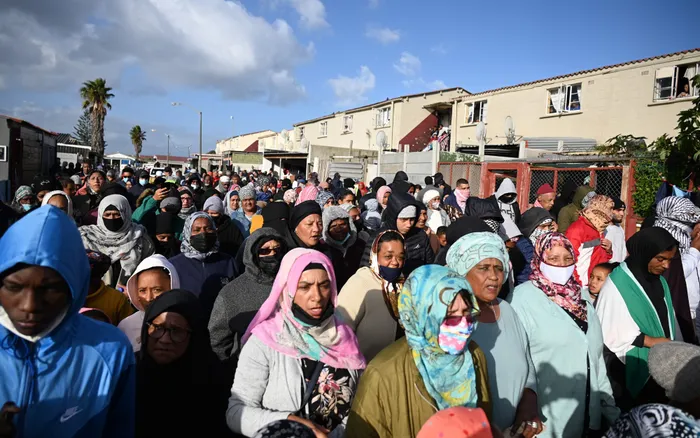Transforming Listening into Justice: A Measurable Plan for the Cape Flats

Hanover Park residents and leaders march to call for an end to ongoing gang violence in the community.
Image: Ayanda Ndamane / Independent Newspapers
We welcome Acting Police Minister Firoz Cachalia’s decision to walk the streets of the Cape Flats with humility and to listen before prescribing. That posture matters. But let us be honest: for mothers planning life around gunfire and for shopkeepers pricing in extortion, “listening” without execution is another broken promise. We need a public compact that turns empathy into convictions, and that measures progress in weeks and months not election cycles.
First, the history. The Cape Flats is a geography engineered by apartheid: families uprooted by the Group Areas Act, resettled on the city’s margins without jobs, transport, or safety. Generations inherited poverty and trauma; gangsterism grew where the state removed dignity and opportunity. Any serious safety plan must keep this structural truth at its core. Policing alone cannot heal it; but a competent, constitutional police service is a non-negotiable foundation for everything else.
Second, the record. Over the past decade the City of Cape Town and the Province have poured substantial money into safety: more uniforms, more vehicles, more cameras, more drones, more command-and-control. Yet homicide and shootings have remained intolerably high across many township precincts. That is not a partisan talking point it is the lived experience of ordinary people. Money without an end-to-end justice chain is theatre. Arrests that do not become convictions are photo ops, not protection.
Third, the governance debate. Some argue the answer is to devolve investigative powers to municipalities with a simple two-word amendment to national law. I disagree. Splitting investigation between spheres risks building two systems one for the wealthy with ample municipal capacity, and another for the poor. Justice must not depend on a ratepayer’s postcode. South Africa needs one investigative spine, clear chains of custody, and common standards that bind every station and every city.
So what should we do immediately and measurably?
One: Lock in Homicide-Precinct Compacts. Identify the worst-affected precincts Mitchells Plain, Delft, Khayelitsha, Nyanga, Philippi East and others and sign annual compacts between SAPS, the City and the Province with three quarterly metrics: (1) shootings and murders, (2) conviction rates for illegal firearms and extortion, and (3) forensic turnaround times. Publish the scorecards. If we cannot say, precinct by precinct, whether safety is improving, we are managing press statements, not crime.
Two: Standardise 72-hour prosecution packs. In gun and GBVF arrests, the first three days decide the case. Every priority arrest must leave the station with a prosecutor-ready pack: witness statements, admissible video from EPIC/CCTV/ALPR, QR-sealed exhibits, and a ballistic correlation request number. Missing items trigger automatic supervisory review and NPA screening. This is not bureaucracy; it’s how you win in court.
Three: Create a Forensics Fast Lane (14/30/60). Fourteen days for preliminary ballistic hits, 30 days for priority GBVF DNA, 60 days for confirmatory ballistics tracked on a public dashboard. The bottleneck is real; put a clock on it, surge capacity where necessary, and report compliance monthly. Communities are not asking for miracles; they’re asking the state to meet its own timelines.
Four: Stand up a Joint Extortion Task Team. Co-locate SAPS, NPA and SARS to target protection rackets in housing, construction, taxi nodes and municipal permitting. Measure success as “days of stoppage avoided” and “sites delivered”, not just arrests. Pair this with beneficial-ownership vetting, debarment for front companies, and “contract-watching briefs” that follow cases from complaint to sentence.
Five: Protect witnesses. Without witnesses, cases die. Fund a micro-witness-protection scheme for the Cape Flats safe-house vouchers, transport and stipends administered via the NPA for women and community members targeted by gangs. It is cheaper than funerals and stronger than slogans.
Six: Put municipal muscle under one investigative spine. Keep national authority for investigation, but embed seconded City officers inside Joint Case-Building Units led by SAPS detectives, with embedded prosecutors. Use one digital docket, one chain of custody, one set of standards. Devolution is a debate; integration is a decision we can take today.
Seven: Rebuild legitimacy as a performance multiplier. Equip hot-spot patrols and JCBU teams with body-worn cameras (automatic upload; no member-controlled deletion); give IPID priority access to flagged incidents; and train officers in procedural justice so that firm policing does not become corrosive policing. Trust is not a soft value; it is the difference between a closed mouth and a key witness.
Finally, leadership and accountability. Faith leaders like Imam Rashied Omar and the Muslim Judicial Council have put moral authority on the table and asked for an intelligence-led paradigm shift. The Provincial Commissioner owed them a timely, substantive response and must provide it. Equally, City leaders should match their technology announcements with outcome data, not inputs. The Minister should chair a monthly Minister–Faith–Civic Forum and release, each quarter, a single public safety pack that unites SAPS, City and Province metrics.
The door has been opened by listening. Now we must walk through it with courage and competence. If we do these seven things with discipline, families on the Cape Flats will feel the difference where it counts: fewer shots fired, faster case progress, and more dangerous men behind bars. That is how humility becomes justice and how we keep faith with those who have waited far too long.
* Faiez Jacobs is a former Member of Parliament, founder of The Transcendence Group, Capetonian, Activist, and Servant of the People.
** The views expressed do not necessarily reflect the views of IOL or Independent Media.
Related Topics: